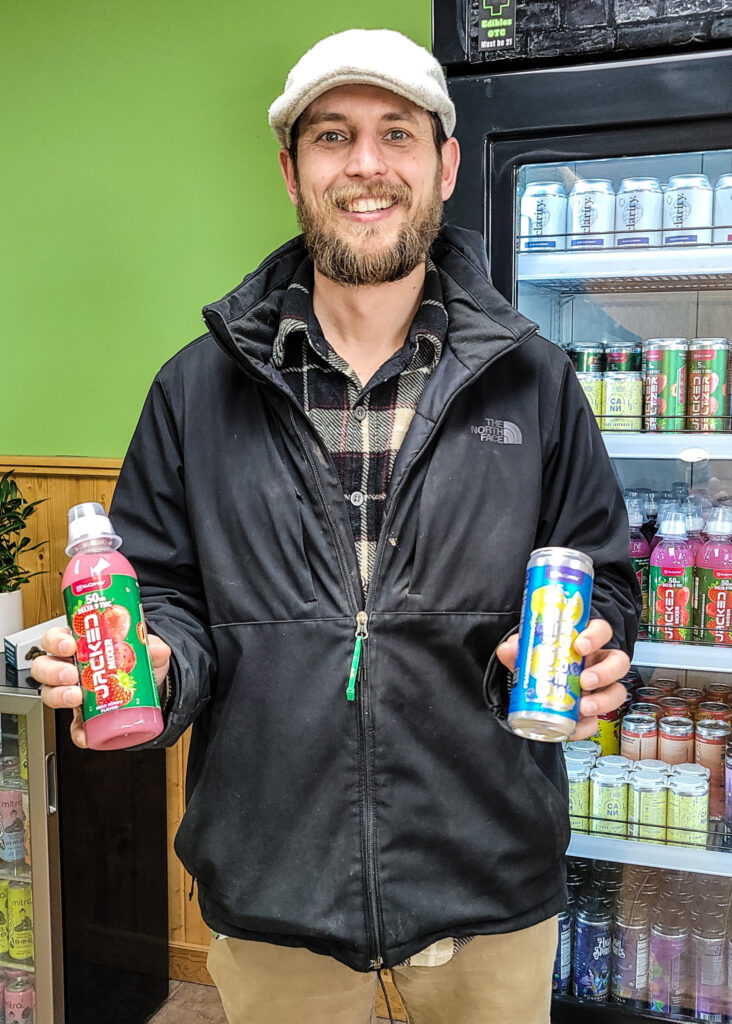moorhead business
Nancy Edmonds Hanson

Pharmacist Steve Rosenfeldt provides THC-infused edibles — seltzer, candy, salves and tinctures — at Ediblz OTC, located next door to the Midtown Tavern, the former Duane’s Pizza, on Highway 10. (Photo/Nancy Hanson.)
Ediblz OTC, Steve Rosenfeldt’s new shop next door to the Midtown Tavern, approaches the sale of THC-infused seltzers, candy, salves and tinctures from a different point of view. A registered pharmacist, his focus is on the therapeutic value of the hemp-derived products on his shelves and in the cooler.
He speaks from personal experience. Four years ago, Steve and his wife Jade lost their four-month-old daughter Adeline to respiratory failure. “I spiraled down into a mental health crisis that lasted three years,” he says. “I couldn’t sleep. I had terrible nightmares.” He was hospitalized several times for depression; at one point, he says, he was taking 16 prescribed pills a day.
Cannabis, he asserts, “saved my life.” A relative who had dealt with trauma himself suggested trying it. “My doctor was OK with that, so I did. Instead of pills and alcohol, I got into Minnesota’s medical marijuana program, and I do think it saved my life.”
He has carried that therapeutic perspective into his new enterprise. He stocks a range of the hemp-derived THC-infused products that became legal in Minnesota in July 2022; many also include a range of CBD components. They are manufactured by Minnesota companies under regulation and supervision by the state, with each serving — a can of seltzer, a square of chocolate — containing no more than 5 milligrams of Delta-9, the molecular component of THC that creates the high associated with cannabis. He does not sell vape pens, focusing exclusively on edible products.
Steve says industry research reveals the average customer of products like those he sells is 41 years old and looking for relief. “They’re dealing with pain, anxiety, sleep problems,” he explains. “Some are trying to stop drinking alcohol.” Though his shop is very young, he says he already has several regular customers who report success with cutting back or eliminating booze and another who has used them to deal with suboxone dependency. “I hear some really cool stories,” he says.
Besides the human products, Ediblz carries products designed to calm and ease the pain of anxious, injured or arthritic dogs.
His pharmacy background gives him a distinctly professional perspective on the value of THC edibles and, in fact, efforts to eliminate the prohibition of sales of marijuana to the public. The Moorhead native, who is married to Seventh District Judge Jade Rosenfeldt, earned his doctorate from the North Dakota State University School of Pharmacy 10 years ago. He was working as a pharmacist at Altru Hospital when their personal tragedy sent him spinning off course.
Now back on his feet, Rosenfeldt worked for a medical marijuana dispensary in Fargo before Minnesota’s approval of THC edibles changed the landscape. Dr. Rodney Lee of Moorhead’s Dollar Clinic recruited him to set up in his facility. Two months later, however, they learned that the city’s newly passed regulation does not permit co-location with a medical provider. He looked for a new spot, rented space in the old Duane’s Pizza building, adopted the name Ediblz OTC (“over the counter”), and reopened in January.
At the same time, Rosenfeldt established a relationship with one of his main suppliers, Waseca, Minnesota-based NuQanna. In addition to being a Food and Drug Administration-approved manufacturer of CBD products, the company grows, distills and packages what it calls “a new social beverage” under the Jacked Seltzer brand, along with topicals, chocolate and gummies.
The front area of the new Ediblz location is a dispensary for his retail products. He plans to use the rest of the space as a distribution hub for NuQanna products. Rosenfeldt has so far assisted entrepreneurs who are setting up THC shops in Breckenridge and Detroit Lakes. Now that the Barnesville City Council has rescinded its moratorium on implementing the sale of THC edibles, he plans to also expand his own retail business there.
As a pharmacist, Rosenfeldt shakes his head at the debates in St. Paul and Bismarck over legalizing cannabis for adult use. Legislators’ objections, he says, don’t hold water: “They continually bring up the danger of children getting into gummies,” he observes. “There are literally hundreds of things in every house that are more dangerous to kids, including alcohol.” Citing other frequently cited scares about overdosing on marijuana, he asserts, “That’s not a life-threatening emergency. It’s ridiculous to ban it. Cannabis does not have the direct effect on dopamine that other substances do.”
Legalization, he points out, could have a positive effect on communities. “It takes away the illegal markets that sell weed right now with no regulation or taxation whatsoever, and it eliminates the dangers of street weed grown with pesticides and fungicides — all the unknown stuff you inhale when you smoke it.”
The future of cannabis is up in the air; whatever is decided is guaranteed to have an effect on his business. He anticipates legalization, and fully supports it. “The endocannabinoid system has been neglected by pharmacy and medical schools alike because of its illegal status,” he says. “The prohibition of cannabis has been one of the cruelest things you can do to people who are hurting.”


